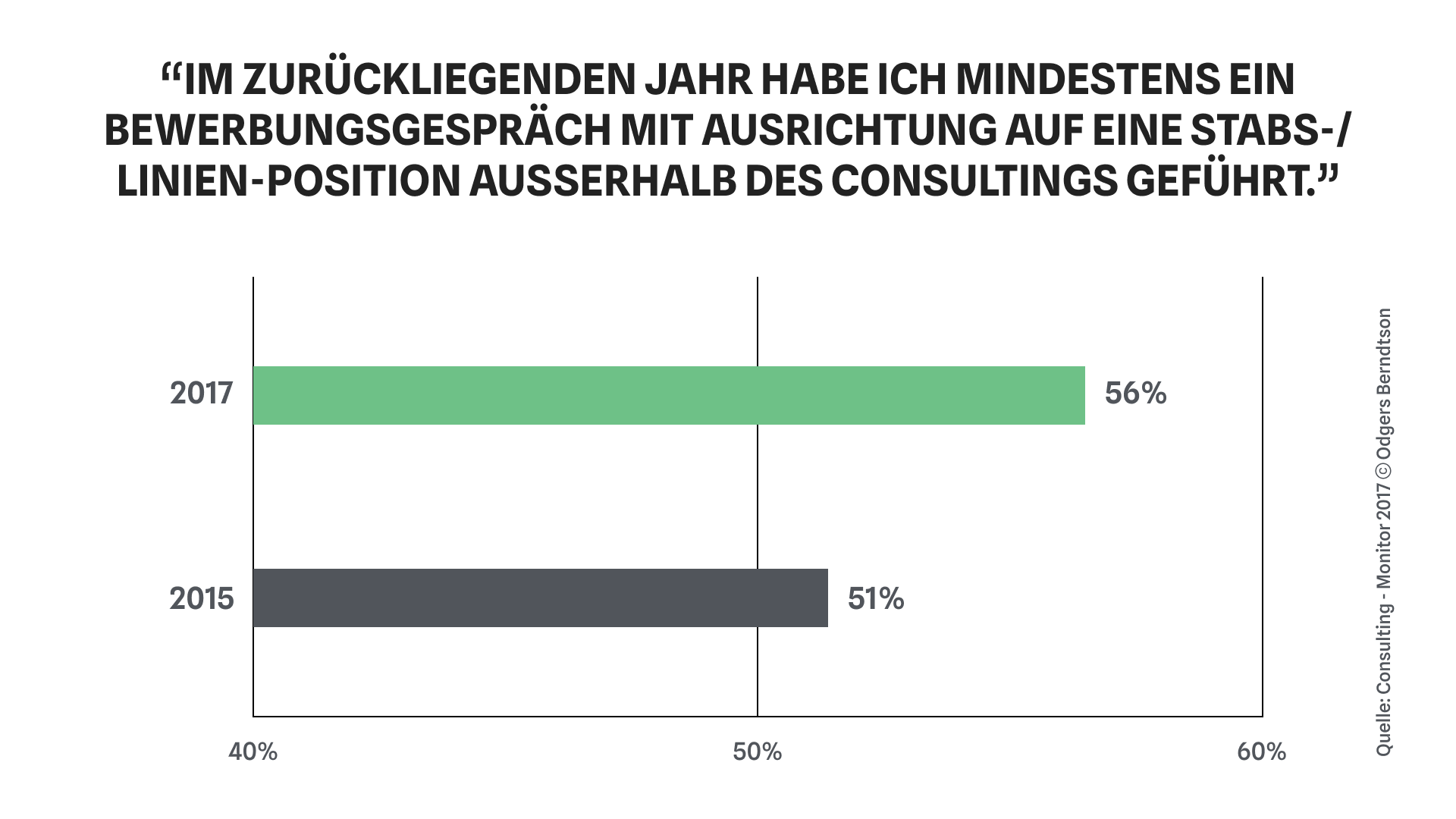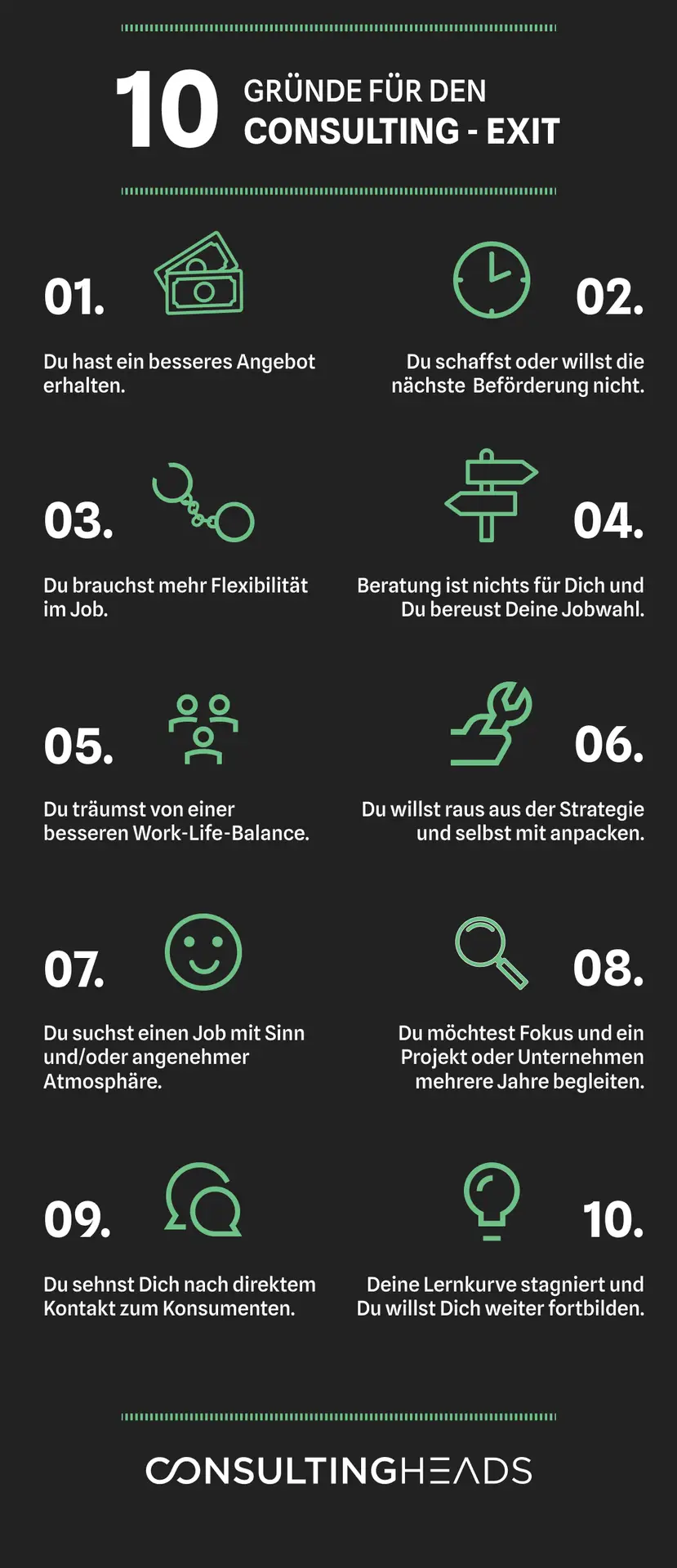As a consultant, you have a profession that is very popular among young graduates. A steep learning curve, the exciting day-to-day work and the high compensation have probably also convinced you in your career choice. With a flawless resume and intensive preparation for the difficult interviews, you had to prevail against the great competition. Many fail on the way to the final offer, but you made it to the goal with a lot of ambition. Congratulations!
However, if after one or two years on the job you are already thinking about your exit and the next steps in your career, then you are like most consultants. Many get ahead of the “up or out” principle and decide to “out” themselves after just a few years. But why is it that only a fraction of those who start a career in consulting also retire as consultants?
The exit as a natural career step
The numbers show: In almost no other professional field is the fluctuation rate as high as in consulting. More than half of the 2,500 management consultants surveyed in the “Consulting Monitor 2017” study are seriously considering quitting in the near future:
Also the candidate pool of consultingheads also confirms the high turnover rate within the consulting industry: 71% of our users who are actively looking for new career opportunities only have a maximum of five years of consulting experience.
In management consultancies, this fast-moving change is quite normal. The exit is seen as a positive and natural career move. The entire recruiting and the pyramid-shaped corporate structure are geared to this.
The 10 most common reasons for quitting
Usually, several factors play a role in the decision to exit. Maybe you are still undecided whether you really want to get out. Then hopefully the following list of the most common reasons for exit will help you get more clarity.
Above all, ask yourself what initially motivated you to become a consultant. By contrasting and weighing the pros and cons, you can better identify whether it’s just a short-term frustration or a long-term dissatisfaction at work. After all, such an important career move should be well thought out.
1. An offer you cannot refuse
As a consultant, many doors will be open to you after your exit, because your skills will be in high demand. You are broadly positioned and get to know many different industries through the various projects. The probability is high that you will regularly receive interesting offers and requests. Perhaps the following scenarios sound familiar to you:
- You have convinced a client that you are the right person for the job.
- Your consultancy has a strong alumni network and will provide you with good connections.
- Requests from headhunters land in your mailbox every day via Xing or LinkedIn.
- You are on an online career platform like consultingheads logged in.
If you are finally offered an attractive career opportunity, it is understandable that you take the chance and accept the better offer. Some consultants already enter their jobs knowing that they only want to stay for the short term. They use their employment as a stepping stone to enjoy the promising exit opportunities to come.
2. "Up or out" - The next promotion is on the horizon
In management consulting, your career ladder and its individual stages are clearly pre-structured. ” Up or out ” – if you don’t manage to get promoted within a limited period of time, you’re out. One reason for your exit could therefore be that you, as a low performer, did not assert yourself against the strong competition. In that case you are more or less forced to look for an alternative. But at least in the beginning, this is rarely the case for young consultants.
It is more likely that you will decide to exit yourself. Be it because of an exciting exit option or because you don’t want to be promoted in the first place. While you may enjoy working on projects, the next career stage involves other responsibilities that may be less appealing to you. For example, as a manager you are often also responsible for selling the projects. If you don’t enjoy it, it’s time for you to take advantage of the many exit options and reorient yourself professionally.
3. Desire for more flexibility
As a management consultant, you have a profession that is characterized by strictly regulated structures. You can’t just pick teams, projects and clients, they are usually assigned to you. You also have little control over the long hours you work. If a certain level of decision-making freedom is essential for your job satisfaction, you will seek an exit after some time.
But if you enjoy your job apart from that, we have good news for you: You can leave your management consultancy without turning your back on the consulting profession completely. You can achieve this with a Freelance work . Here you can choose your projects and customers freely. We at consultingheads help you to find suitable projects on a regular basis.
4. Dissatisfied with the choice of job
As in any other job, it can happen in consulting that you realize after a few months that you have made the completely wrong career choice. You just don’t enjoy management consulting. You may have sought the profession from the beginning for the wrong motivation, such as solely because of the high salary or the attractive exit opportunities. In doing so, you have disregarded what the job actually means and whether it suits you at all.
In any case, you imagined the profession as a consultant:in somehow differently. After the initial euphoria, you regret your decision. You perceive the shadow sides more and more clearly, which you ignored or underestimated before. But don’t worry, you don’t have to slog through the early years these days. We have helped many consultants like you to find exciting exit options even with only a few years of professional experience.
5. A better work-life balance
Coming home late at night and spending entire weekends on the project in another city – that often loses its appeal after a few months. The lifestyle that seemed exciting and thrilling in the beginning suddenly doesn’t suit you anymore. With your 60- to 70-hour work week , you don’t even want to figure out the hourly wage. You’re just stressed out and longing for a better work-life balance.
Above all, personal reasons play a role here. You’re tired of your social life suffering because of work and finally want to have time for friends and leisure activities again – even during the week. At the latest, when your life circumstances change and your family offspring is imminent, you start looking for a job that offers a higher hourly wage and more free time.
6. You want to lend a hand yourself
After the first few years in consulting, the slow and inefficient company structures will probably frustrate you. You make the effort to set up thoroughly thought-out methods and models, but their actual implementation then depends on the customer himself. Most of the time, your work bears fruit only in slow motion. You often don’t notice the outcome at all and sometimes even your complete results just end up in the drawer.
There comes a point when money and prestige are no longer satisfying for you. Instead of giving external strategic advice, you get the desire to take a hand in a business yourself. You long for more personal responsibility and decide to exit into industry or even start your own business. But beware: especially in industry, most employers want to hire you for your consulting skills and put you in strategic positions.
7. A job with meaning in a pleasant atmosphere
In management consultancies, there is a strict business dress code. In addition, you have to work under high competitive pressure and constant observation. If this annoys you, then you are like many other consultants who long for a relaxed working atmosphere with flat hierarchies. They want a company where they can develop and where the relationship with colleagues and superiors is more relaxed. That’s why they decide to exit, for example into smaller companies or start-ups.
Apart from a relaxed work atmosphere, a fulfilling job can also provide more satisfaction at work. Maybe you’re fed up after years of working entirely for profit. Now you long to use your skills to solve problems that are more important globally. That’s why you choose to exit into an ethically-motivated company that may even be going all nonprofit.
8. More focus and not having to start from scratch again and again
Do you also feel that your work on the changing projects no longer seems so exciting, but rather repetitive? With each new job, you have to start from scratch again and you don’t have the opportunity to really focus on a project.
As a consultant, you have to prove yourself to CEOs who have often been focusing on a company or product for more than ten years. Although you can only familiarize yourself with the project superficially, you are then to assist this CEO as an advisor:in. This can be overwhelming and frustrating. It is quite normal that you long for more focus and to sit on the other side of the table yourself.
9. Desire for direct contact with the consumer
You may also be considering quitting because you lack direct points of contact with the consumer. Because in consulting, you mainly deal with companies and therefore only come into contact with consumers indirectly.
You may only realize after a few years on the job that you no longer feel comfortable in this B2B environment. Then you have the opportunity to move to a smaller B2C company or to start your own company if you have an idea for a product yourself.
10. Thirst for knowledge
If you’re always eager to learn something new, you’ve made exactly the right career choice with management consulting. In the first few years in consulting, you can benefit from the very steep learning curve. With every project and every client, you gain new insights and insights into a wide variety of industries and business models. The work in the competent and experienced teams stimulates you and through the many training courses you can quench your thirst for knowledge.
But after a few years, as in any other profession, the learning curve flattens out in consulting. However, due to the initial exponential growth, stagnation may seem a bit more extreme to you than in other jobs. You may feel like you’re hitting a wall after a sprint run. One thing is clear: You have a desire for change and new learning effects. You are looking for a new professional challenge or decide to pursue further (MBA) studies.
In management consultancies, this fast-moving change is quite normal. The exit is seen as a positive and natural career move. The entire recruiting and the pyramid-shaped corporate structure are geared to this.
Desire for change
What all reasons for leaving have in common is the desire for change. That’s human, because you can imagine working for a consulting firm something like this: You rent a new apartment, clean it out and decorate it. After six months of work, you hand it over and pick up a new apartment to start all over again. With the first apartments it is exciting and fun, but with time and increasing age it becomes monotonous and exhausting. At some point, you’ll yearn for a new job – maybe even to build your own house or do something completely different.
In any case, you should be careful not to make any rash decisions and to plan your exit thoroughly and preferably at an early stage. It makes sense that you keep up to date on your career options on a regular basis. We’ll help you do that and make sure you don’t miss out on any important career opportunities. At consultingheads you will find exclusive jobs for consultants only. Plus, we’ll send you the best opportunities conveniently to your inbox every week. Click hereto learn more.
Sources:
- Odgers Berndtson (2017): “CONSULTING-MONITOR 2017″ Accessed at: https://www.odgersberndtson.com/media/3899/consulting-monitor-2017.pdf










